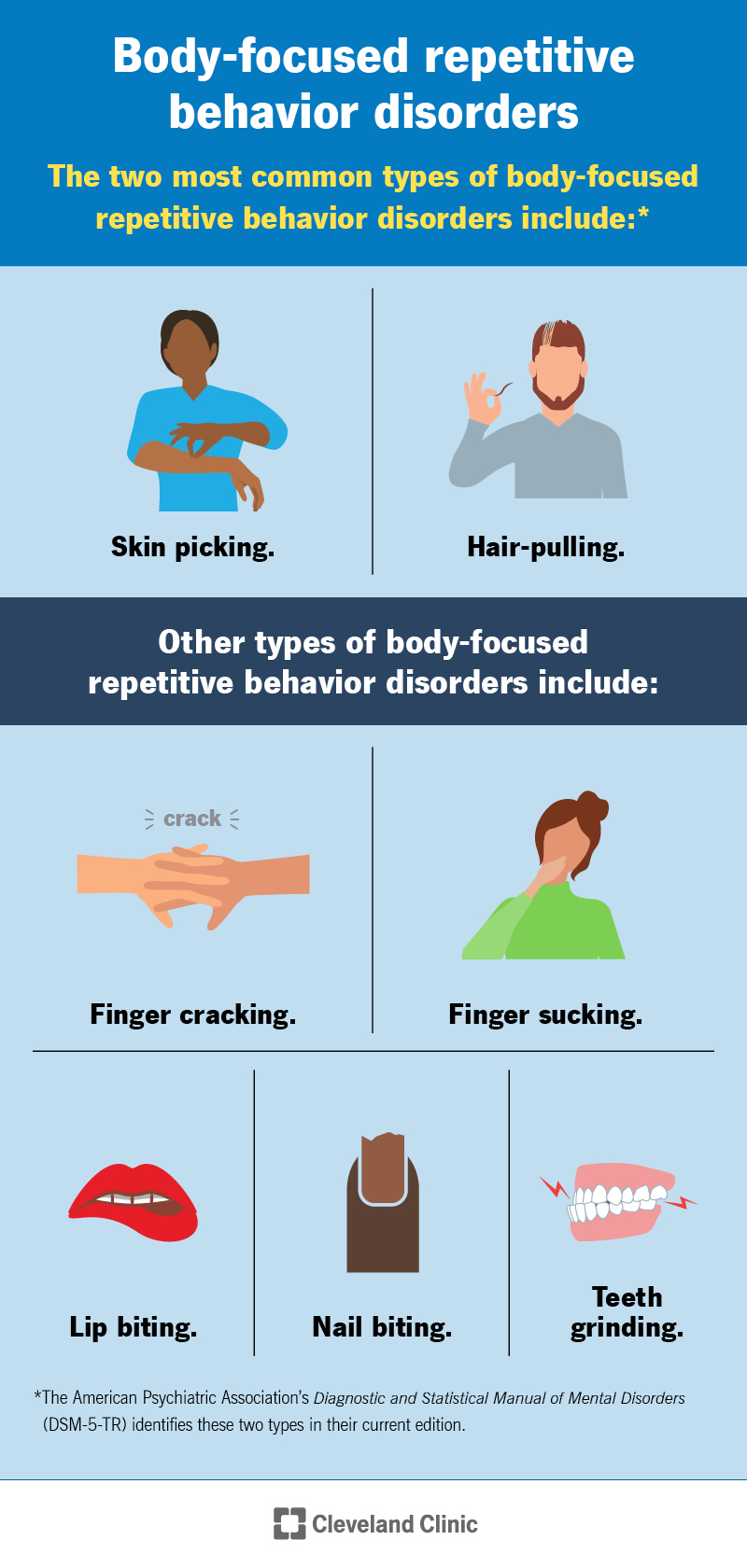Body-focused repetitive behavior (BFRB) disorders are a group of self-grooming actions that may harm your body. These include skin picking, hair pulling and nail biting, among others. BFRBs are hard to stop and you may not even know you do them. Therapy and medications may help.
Advertisement
Cleveland Clinic is a non-profit academic medical center. Advertising on our site helps support our mission. We do not endorse non-Cleveland Clinic products or services. Policy

Image content: This image is available to view online.
View image online (https://my.clevelandclinic.org/-/scassets/images/org/health/articles/body-focused-repetitive-behavior-bfrb)
Body-focused repetitive behavior disorders, also known as BFRBs, are a group of conditions that cause you to perform self-grooming actions that unintentionally harm your body.
Advertisement
Cleveland Clinic is a non-profit academic medical center. Advertising on our site helps support our mission. We do not endorse non-Cleveland Clinic products or services. Policy
Many people recognize BFRBs as nervous habits, like picking the skin around your nails or cracking your knuckles when you’re bored. But these behaviors are more than just something to do to pass the time. Research suggests your genetics, brain structure and emotions play a role in why these behaviors happen.
You may try to reduce how often you perform these behaviors but find it difficult to stop them. BFRBs come on with an intense, uncontrollable urge and may bring feelings of pleasure or satisfaction when you do them. Treatment options are available to help you if you need it.
The two most common types of body-focused repetitive behavior disorders include:
The American Psychiatric Association’s Diagnostic and Statistical Manual of Mental Disorders (DSM-5-TR) identifies these two types in their current edition.
There are other types of BFRBs, including:
Advertisement
While these aren’t specified in the DSM-5-TR, a healthcare provider can still diagnose these types as a related BFRB disorder.
Several studies found that between 0.5% and 4.4% of people have a clinical BFRB diagnosis. However, the rate of occurrence is actually much higher because many people don’t reach out to a healthcare provider for help with these conditions.
Common body-focused repetitive behaviors include:
You may feel:
Healthcare providers aren’t sure why BFRB disorders happen. Research suggests the following may contribute:
While there are some mental health conditions where factors like vanity or a desire to change your appearance drive your behavior, these don’t cause BFRBs.
You may be more at risk of BFRBs if you:
Repeatedly biting, picking or pulling at different parts of your body can lead to the following complications:
You may experience a range of emotions that affect your mood, self-esteem and confidence due to how these self-modifying behaviors unintentionally change your appearance. A mental health professional can help you manage these.
A primary care physician, dermatologist or dentist may be the first to recognize the signs of BFRBs. A provider may ask you about your symptoms and how you feel. They may then refer you to see a mental health provider, such as a psychologist or psychiatrist.
A mental health provider will offer an evaluation to see if your symptoms match the following criteria to make a BFRB diagnosis:
Advertisement
BFRB treatment may include one or a combination of the following:
It’s important to stick to your treatment plan even if you’re feeling better. You should continue to take the medications prescribed to you as directed unless your provider approves any changes made to your routine.
BFRBs look and feel different for each person. You may feel anxious, comforted or distressed. It’s difficult to know when the urge to perform a behavior will happen because sometimes, you aren’t aware that you’re doing it unless someone points it out. Over time, these behaviors may damage your body or lead to complications like scars or infections.
Advertisement
Treatment options, usually a combination of therapy and medications, help manage BFRB symptoms. It takes time and practice to get there — you won’t stop these behaviors overnight. If you have any questions about what you can expect from your treatment plan, talk to your provider.
Visit a healthcare provider if you have body-focused repetitive behaviors that you want to stop but have trouble managing on your own. This may include skin picking, teeth grinding or hair pulling, among others.
Let a healthcare provider know if you have symptoms of an infection like pain, swelling or pus leaking from a wound.
No one wants to feel out of control of their own actions. It doesn’t matter how much you want to stop, nothing seems to work. This is the reality of having a body-focused repetitive behavior (BFRB) disorder. Fortunately, you don’t have to continue these behaviors. A healthcare provider can help you find a solution.
Many people find success in managing these symptoms with therapy and/or medications. It can take several months before you feel better and start to see results. But your care team will be there to help you maintain and manage BFRBs throughout your life.
Advertisement

Sign up for our Health Essentials emails for expert guidance on nutrition, fitness, sleep, skin care and more.
Learn more about the Health Library and our editorial process.
Cleveland Clinic’s health articles are based on evidence-backed information and review by medical professionals to ensure accuracy, reliability and up-to-date clinical standards.
Cleveland Clinic’s health articles are based on evidence-backed information and review by medical professionals to ensure accuracy, reliability and up-to-date clinical standards.
Your mental well-being is just as important as your physical well-being. Cleveland Clinic’s mental health experts can help you live life to the fullest.
